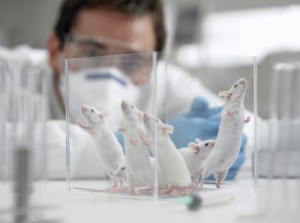Government stands by pledge but shies away from setting numerical target.

British ministers insisted today that they are still committed to reducing the number of animals used in research, but warned that this might not mean a reduction in the overall number of scientific procedures involving animals.
Science minister David Willetts told reporters in London that the government was “absolutely committed” to the '3Rs' of reducing, replacing and refining the use of animals. “This is about the scientific community doing its best whenever possible to reduce and replace the use of animals,” he added. “This isn’t about a numerical target.”
The number of scientific procedures involving animals in the United Kingdom reached a peak of around 5.5 million in the 1970s before dropping to just over 2.5 million in 2000. Since then, however, it has increased to more than 4 million in 2012, despite the government's promise in 2010 to “work to reduce the use of animals in scientific research”.
Today’s action plan pledges to support the London-based National Centre for the Replacement, Refinement and Reduction of Animals in Research (NC3Rs) in encouraging data sharing between animal researchers to minimize duplication; and to increase the role of government inspectors of animal research in promoting the 3Rs. For example, inspectors will give more guidance to researchers on alternative lab techniques that do not require lab animals.
Norman Baker, the Home Office minister responsible for animal research, insisted that there is no other country doing as much as the United Kingdom to reduce the use of animals in laboratories. He said that the government had already backed work — such as developing non-animal tests for detection of toxins in commercial shellfish — that had led to reductions. Had such work not been done, he added, “we would have a higher number than we’ve currently got”.
Echoing Willetts, Baker said that it would be “artificial” for the United Kingdom to try and set an overall target for the number of animal experiments, given the global nature of science.
UK animal-rights groups criticized today's announcement. The Nottingham-based Fund for the Replacement of Animals In Medical Experiments said that it was disappointed by the lack of targets, and the London-based British Union for the Abolition of Vivisection said that the lack of targets showed that the government was abandoning its 2010 pledge.
Mark Walport, the government’s chief scientific adviser, cautioned that the increase in animal-research procedures seen in official statistics was mainly due to an increase in the breeding of genetically-modified animals — whose births are counted as procedures — and not to what might more generally be considered ‘experiments’, which have remained roughly stable at 2 million per year in the past decade. Walport said that scientists were increasingly transparent about their use of animals, and increasingly sophisticated in how they used them.
Vicky Robinson, chief executive of the NC3Rs, welcomed the report and said that progress was being made. “Most people are starting to get that [3Rs] isn’t a regulatory tick-box. It’s about how we do the best science,” she told Nature.

Related links
Related links
Related links in Nature Research
Report slams university’s animal research 2013-Dec-10
Best way to kill lab animals sought 2013-Aug-06
Italian scientists fight back on animal testing 2013-Jun-03
Nature special: animal research
Related external links
Rights and permissions
About this article
Cite this article
Cressey, D. UK ‘absolutely committed’ to reducing animal use in research. Nature (2014). https://doi.org/10.1038/nature.2014.14688
Published:
DOI: https://doi.org/10.1038/nature.2014.14688

